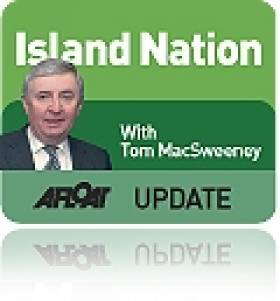Displaying items by tag: membership fees
Casting a Fly over Sailing Club Memberships
Some boating clubs might be feeling the pinch but not all of them. As Magheramore reveals there is one club with two dozen boats freely available for 400 members to use on a 'first come first served' basis. It is a budget model Irish sailing clubs might do well to study.
There is a club a few miles from the capital that owns 25 boats. These boats are freely available to all 400 club members at any time during the season. The rules are simple; no pre-booking, first-come-first-served, boats are signed out and signed back in, and any damage must be reported. This system has worked well for over 70 years!
Maintenance is carried out by members during off-season work parties. However, little work is actually needed. The boats are tough, fittings are robust, so that the only work needed is a coat of wood preserver on the thwarts and rubbing strakes, and the odd touch up to the gel-coat. It should be pointed out that these are standard boats, not beefed-up "club" versions. Boats are replaced at the rate of about one or two boats per year. The older boats are usually sold off to club members.
The fleet has been built up over the years. Both increased numbers of boats, and renewal of the fleet are financed out of club subscriptions., which are modest to say the least. This year, adult membership is only 55 euro!
The club does not run a bar, but there is a comfortable club room for meetings, or waiting for the rain to pass over.
Unsurprisingly, with membership limited by the lease at 400 adult members, there is a long waiting list. However, the club handles this waiting list in exemplary fashion. Children of members, if they have joined as junior members, automatically become full members after they reach 18. Prospective new members must apply. Applications to join the waiting list are only possible when the committee decides that all on the current waiting list are about to be admitted to the club. After a short application period (which tests potential members integration into local networks as they have to learn that the list is open) the names of all applicants are put into a hat, the first name drawn is first on the waiting list.
It can take some years to be offered membership, depending on turnover, as members leave, or forget to renew. The membership secretary is ruthless when it comes to the due date for annual subscriptions. It is no good bringing out the traditional excuses – the cheque may be in the post, but your membership has gone, and you must re-apply.
This description may sound to good to be true. Yet this club has been operating on the same basis for over 70 years. One might ask why national sailing organisations, the yachting press and other clubs are not promoting this model of club organisation. The answer is simple: did I ever say this was a sailing club? In fact it is an angling club, exclusively dedicated to fly-fishing for trout in a series of lakes not that far from Dublin.
This is yet another example where different groups who all believe, in their own way that "there is nothing – absolutely nothing – half as much worth doing as simply messing about in boats", seem to have little or no contact. Yet we all have much to learn, and we may have more in common than we think. The club I have presented here has solved, in its own way, the problem of how to get on the water without owning a boat.
Personally, I would welcome the idea of a sailing club with a fleet of robust but fun boats freely available to members. Membership might be slightly more than 55 euro per year, but it would be interesting to study the economics of such a structure. As it is, we seem to be settling in to a long period in which many sailors will not be envisaging buying a new boat, or indeed any boat. – Magheramore
Sailing Clubs Must Support Struggling Members
Last month AIB pulled the plug on sailing club fees for staff. Next month the Irish Sailing Association aims to rejig the annual fee it charges to clubs at an egm. They are signs that the necklace of over 70 yacht clubs around the coast and on inland waters are under financial pressure. No wonder as the cost of going sailing, as well as many other sports in Ireland, proves too much to bear for many families.
In his recent column (below) in the Evening Echo Marine Correspondent Tom MacSweeney highlighted the need for Sailing Clubs around the coast to do all they can to help struggling memberships.
Membership is becoming an issue for sailing clubs to judge from what club officers around the coast have been telling me. It is a sign of the economic times. Families and individuals have to examine closely what to do with the money they have left after the government has raided their incomes.
I have been told that club members and particularly those holding family memberships are looking at how much they pay for an inclusive membership and reducing it to just one individual membership. Others have told me that they are faced with deferring payments or foregoing membership altogether.
Clubs are responding to the situation in different ways.
While the more realistic are taking steps to deal with the issue, there are indications that others are ignoring a situation that, it appears, could affect the popularity of the sport. This may be from an entrenched position or snobbish attitude where they don't want to admit difficulties in public. An inadvisable situation when income is being squeezed and the future challenged.
Payment systems such as monthly standing orders, direct debits, concessions for early payments, have been introduced by those clubs realistically dealing with the situation. Sailing is not the only sporting activity being affected, I hear of golf, rugby, soccer and other clubs feeling the pinch of reduced incomes, soaring taxes and charges levied on household incomes by the government. Something has to give because there is a limit to the amount of money people have. Government politicians seem incapable of understanding that people have not got enough money or sufficient disposable incomes because of the State raping their salaries.
Another aspect of the impact of deteriorating income levels appears to be the demand for marina spaces, with boat owners not as active as they had been in seeking berths and telling me frankly they cannot stretch incomes to afford prices during high season. Some boatyards are feeling the effects also around the country, as are yacht sales. A lot of boats are for sale and replacement plans by sailors who had planned to upgrade have been put on hold.
The oldest yacht club in the world, the Royal Cork at Crosshaven, has been responding to the challenging times. Last season it introduced a monthly membership scheme and a crew membership system as an innovative response to the challenge which the sport faces.
When he took over as the club's new Admiral at its annual general meeting last Monday night in the Crosshaven clubhouse, Peter Deasy acted immediately, announcing that the club would take further steps to address the issue.
He has taken office for a two-year period in succession to Paddy McGlade, a post which follows his successful leadership of the last Cork Week two years ago when he was Chairman. Cork Week will be held again this year, from July 7 to 13.
"There is a membership challenge, it is one facing all clubs in these times and it will be addressed by this club," he said. He stressed the importance of encouraging more people into sailing. The club is to carry out a review of its membership system, amongst other steps. On Monday night members approved an increase in subscription levels for those over 65, who pay a reduced rate as 'seniors,' as is the situation in many clubs.
The RCYC is taking a realistic, determined approach toward what is an issue born of these difficult national economic times. Peter Deasy also emphasised the importance of encouraging young sailors and keeping them within the sport.
This is a topic I have addressed before. Not every young sailor will reach the top competitively, but all are needed to remain in the sport in this island nation. When they emerge from dinghies there is a difficulty, experienced in many clubs around the coast, of maintaining their involvement.
AIB No Longer Covering Sailing Club Subs for Staff
#SAILING CLUBS - Sailing enthusiasts on AIB's staff have taken a blow to the wallet as the bank is to stop paying club membership fees for employees, the Irish Independent reports.
In an e-mail seen by the paper, AIB head of human resources John Conway said the cuts - which came into effect on 1 January - were the result of a review of benefit structures within the bank, which is dealing with "ongoing problems".
The change brings to an end two benefits-in-kind that had been considered significant attractions for new employees, the other being special lending rates for staff members.
Up till the end of 2011, AIB covered 50% of club membership fees up to €1,250 for rank and file employees, and 100% of fees up to €2,500 for management. Bank of Ireland staff continue to receive similar perks.
The moves comes not long after the Irish Sailing Association's announcement of proposals to revise its sailing club membership fee structure.
As previously reported on Afloat.ie, the ISA will convene an EGM next month to discuss changes to the 'joint membership scheme' in favour of a "single fee formula that is proportionate to a club's membership subscription income".
The Irish Independent has more on the story HERE.
































































